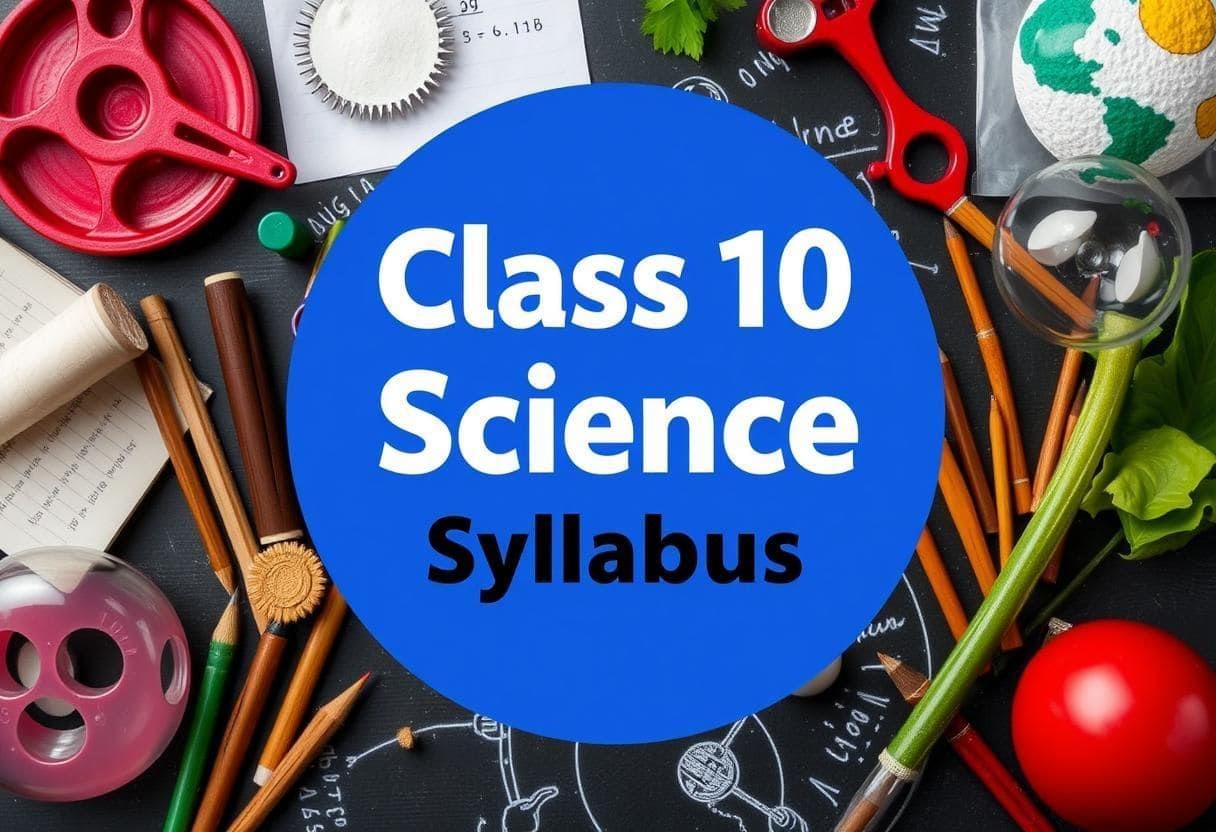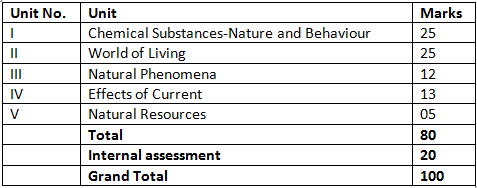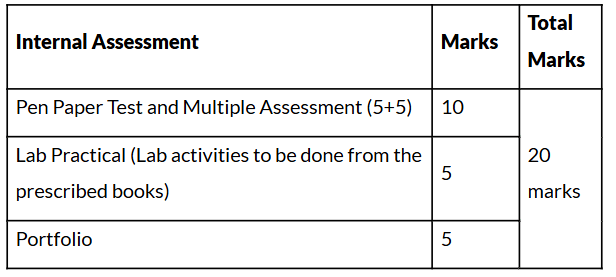CBSE Class 10 Science Syllabus 2025-2026 | How To Prepare For Class 10 PDF Download

The CBSE Class 10 Science Exam is one the most important papers for Class 10 students. As a Class 10 student, you must have a strategy to prepare for your Science exam if you want to score high in exams. The CBSE Class 10 Science Syllabus 2025 - 2026 can be of great help to understand which chapters or topics to be focused more on according to their weightage. The syllabus for Class 10 Science is discussed in detail in this document.
CBSE Class 10 Science Weightage
The weightage of different units of Class 10 Science is given below:
CBSE Class 10 Science Syllabus for 2025 - 2026
We have provided below the CBSE syllabus of Class 10 Science. This is the reduced syllabus based on which the CBSE Board Exam 2025 - 2026 will be conducted. Students must go through this updated Science syllabus before they start the study of a new chapter as some of the topics and/or chapters have been removed from this new syllabus.
Unit 1: Chemical Substances - Nature and Behaviour
- Chemical reactions and Equations: Chemical equation, Balanced chemical equation, implications of a balanced chemical equation, types of chemical reactions: combination, decomposition, displacement, double displacement, precipitation, endothermic exothermic reactions, oxidation, and reduction.
- Acids, bases, and salts: Their definitions in terms of furnishing of H+ and OH– ions, General properties, examples and uses, neutralization, concept of pH scale (Definition relating to logarithm not required), importance of pH in everyday life; preparation and uses of Sodium Hydroxide, Bleaching powder, Baking soda, Washing soda and Plaster of Paris.
- Metals and nonmetals: Properties of metals and non-metals; Reactivity series; Formation and properties of ionic compounds; Basic metallurgical processes; Corrosion and its prevention.
- Carbon and its compounds: Covalent bonding in carbon compounds. Versatile nature of carbon. Homologous series. Nomenclature of carbon compounds containing functional groups (halogens, alcohol, ketones, aldehydes, alkanes, and alkynes), the difference between saturated hydrocarbons and unsaturated hydrocarbons. Chemical properties of carbon compounds (combustion, oxidation, addition, and substitution reaction). Ethanol and Ethanoic acid (only properties and uses), soaps, and detergents.
Unit 2: World of Living
- Life processes: ‘Living Being’. Basic concept of nutrition, respiration, transport, and excretion in plants and animals.
- Control and coordination in animals and plants: Tropic movements in plants; Introduction of plant hormones; Control and coordination in animals: Nervous system; Voluntary, involuntary, and reflex action; Chemical coordination: animal hormones.
- How do Organisms Reproduce?: Reproduction in animals and plants (asexual and sexual) reproductive health - need and methods of family planning. Safe sex vs HIV/AIDS. Child bearing and women’s health.
- Heredity: Heredity; Mendel’s contribution- Laws for inheritance of traits: Sex determination: brief introduction: (topics excluded - evolution; evolution and classification and evolution should not be equated with progress).
Unit 3: Natural Phenomena
- Light - Reflection and Refraction by curved surfaces; Images formed by spherical mirrors, center of curvature, principal axis, principal focus, focal length, mirror formula (Derivation not required), magnification.
- Refraction; Laws of refraction, refractive index. Refraction of light by spherical lens; Image formed by spherical lenses; Lens formula(Derivation not required); Magnification. Power of a lens.
- Human eye and the Colourful World: Functioning of a lens in the human eye, defects of vision and their corrections, applications of spherical mirrors and lenses.
Refraction of light through a prism, dispersion of light, scattering of light, applications in daily life (excluding colour of the sun at sunrise and sunset).
Unit 4: Effects of Current
- Electricity: Electric current, potential difference, and electric current. Ohm’s law; Resistance, Resistivity, Factors on which the resistance of a conductor depends. Series combination of resistors, parallel combination of resistors, and its applications in daily life. Heating effect of electric current and its applications in daily life. Electric power, Interrelation between P, V, I, and R.
- Magnetic effects of Electric Current: Magnetic field, field lines, field due to a current carrying conductor, field due to current carrying coil or solenoid; Force on the current carrying conductor, Fleming’s Left Hand Rule, Direct current. Alternating current: frequency of AC. Advantage of AC over DC. Domestic electric circuits.
Unit 5: Natural Resources
- Our environment: Eco-system, Environmental problems, Ozone depletion, waste production and their solutions. Biodegradable and non-biodegradable substances.
CBSE Practical Syllabus for Class 10 Science
Practicals should be conducted alongside the concepts taught in theory classes. This will enable you to grasp the concepts better as questions are also asked from practicals.
- A. Finding the pH of the following samples by using pH paper/universal indicator:
(i) Dilute Hydrochloric Acid
(ii) Dilute NaOH solution
(iii) Dilute Ethanoic Acid solution
(iv) Lemon juice
(v) Water
(vi) Dilute Hydrogen Carbonate solution
B. Studying the properties of acids and bases (HCl & NaOH) on the basis of their reaction with:
a) Litmus solution (Blue/Red)
b) Zinc metal
c) Solid sodium carbonate - Performing and observing the following reactions and classifying them into:
A. Combination reaction
B. Decomposition reaction
C. Displacement reaction
D. Double displacement reaction
(i) Action of water on quicklime
(ii) Action of heat on ferrous sulphate crystals
(iii) Iron nails kept in copper sulphate solution
(iv) Reaction between sodium sulphate and barium chloride solutions - Observing the action of Zn, Fe, Cu and Al metals on the following salt solutions:
i) ZnSO4(aq)
ii) FeSO4(aq)
iii) CuSO4(aq)
iv) Al2 (SO4)3(aq)
Arranging Zn, Fe, Cu and Al (metals) in the decreasing order of reactivity based on the
above result. - Studying the dependence of potential difference (V) across a resistor on the current (I) passing
through it and determine its resistance. Also plotting a graph between V and I. - Determination of the equivalent resistance of two resistors when connected in series and parallel.
- Preparing a temporary mount of a leaf peel to show stomata.
- Experimentally show that carbon dioxide is given out during respiration.
- Study of the following properties of acetic acid (ethanoic acid):
i) Odour
ii) solubility in water
iii) effect on litmus
iv) reaction with Sodium Hydrogen Carbonate - Study of the comparative cleaning capacity of a sample of soap in soft and hard water.
- Determination of the focal length of:
i) Concave mirror
ii) Convex lens
by obtaining the image of a distant object. - Tracing the path of a ray of light passing through a rectangular glass slab for different angles of incidence. Measure the angle of incidence, angle of refraction, angle of emergence and interpret the result.
- Studying (a) binary fission in Amoeba, and (b) budding in yeast and Hydra with the help of prepared slides.
- Tracing the path of the rays of light through a glass prism.
- Identification of the different parts of an embryo of a dicot seed (Pea, gram or red kidney bean)
CBSE Class 10 Science Internal Assessment
The internal assessment in Class 10 Maths exam will be of 20 marks. The breakdown of components of internal assessment of Class 10 Maths is given below: 
Typology of Questions in Science Syllabus 2025 - 2026
VSA including objective type questions, Assertion – Reasoning type questions; SA; LA; Source-based/ Case-based/ Passage-based/ Integrated assessment questions. An internal choice of approximately 33% would be provided.
Internal Assessment (20 Marks)
(i) Periodic Assessment - 05 marks + 05 marks
(ii) Subject Enrichment (Practical Work) - 05 marks
(iii) Portfolio - 05 marks
Best Reference Books for Class 10 Science
The list of books prescribed by the Board -- Science-Text book for class X- NCERT Publication
- Assessment of Practical Skills in Science- Class X- CBSE Publication
- Laboratory Manual-Science-Class X, NCERT Publication
- Exemplar Problems Class X – NCERT Publication
EduRev provides complete solutions to NCERT textbook for Class 10 Science as well as solutions to NCERT Exemplar. These solutions are easy to understand, reliable and made by experts with 10+ years of experience. Apart from NCERT students can also practice questions from Lakhmir Singh and Manjit Kaur.
How to prepare for Science Class 10 Board Exam with EduRev?
EduRev Infinity Package for Class 10 includes:
- Subject-wise Courses: Courses for all the compulsory subjects: Science, Mathematics, Social Science, English and Hindi. Each course offers topic-wise video lectures, detailed notes & online tests for each topic.
- NCERT Solutions: EduRev provides NCERT solutions for all subjects. These solutions cover all the questions, are reliable and are explained in a step-by-step manner.
- Sample Papers: EduRev has all the latest sample papers with the latest exam pattern. These sample papers are excellent for practising according to the latest syllabus and exam pattern.
- Past Year Papers: EduRev offers past year papers for Class 10 for subjects English, Science, Social Science, Mathematics and Hindi. The past years' papers are available of last 10 years.
- RD Sharma and Lakhmir Singh and Manjit Kaur Solutions: Solutions to reference books RD Sharma and Lakhmir Singh and Manjit Kaur are available at EduRev. These books are helpful in practising different types of questions.
- Revision Notes for all Subjects: EduRev provides chapter notes for Class 10 students. It covers topics from various subjects such as Mathematics, Science, Social Science, English, etc. The notes are concise and well-structured, which makes it easier for students to find the information they need quickly.
- Crash Course for Class 10: EduRev's Crash Course for Class 10 is an online course that provides a comprehensive overview of important topics for students preparing for their Class 10 examinations. The course covers topics from Mathematics, Science, Social Science, English and Hindi. It includes video lectures and practice questions that are designed to help students understand the concepts better and apply them in their exam preparation.
|
8 videos|16 docs
|
FAQs on CBSE Class 10 Science Syllabus 2025-2026 - How To Prepare For Class 10
| 1. What is the weightage of different units in the CBSE Class 10 Science exam? |  |
| 2. What practical experiments are included in the CBSE Class 10 Science practical syllabus? |  |
| 3. How is internal assessment conducted for Class 10 Science? |  |
| 4. What are the best reference books for Class 10 Science preparation? |  |
| 5. How can I effectively prepare for the Class 10 Science board exam? |  |






















